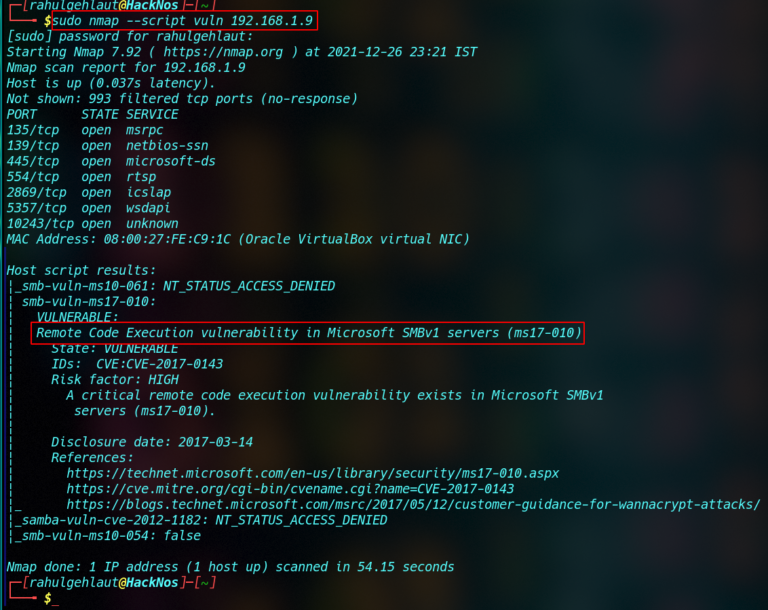Unveiling Network Vulnerabilities: A Comprehensive Guide to Nmap’s Scripting Capabilities
Related Articles: Unveiling Network Vulnerabilities: A Comprehensive Guide to Nmap’s Scripting Capabilities
Introduction
With great pleasure, we will explore the intriguing topic related to Unveiling Network Vulnerabilities: A Comprehensive Guide to Nmap’s Scripting Capabilities. Let’s weave interesting information and offer fresh perspectives to the readers.
Table of Content
- 1 Related Articles: Unveiling Network Vulnerabilities: A Comprehensive Guide to Nmap’s Scripting Capabilities
- 2 Introduction
- 3 Unveiling Network Vulnerabilities: A Comprehensive Guide to Nmap’s Scripting Capabilities
- 3.1 Nmap’s Scripting Engine: A Versatile Tool for Vulnerability Assessment
- 3.2 Running All Vulnerability Scripts: A Comprehensive Approach to Network Security Analysis
- 3.3 Understanding the Importance of Script Selection
- 3.4 FAQs: Addressing Common Queries Regarding Nmap’s Scripting Engine
- 3.5 Tips for Effective Nmap Scripting
- 3.6 Conclusion: Nmap’s Scripting Engine: A Powerful Tool for Network Security Professionals
- 4 Closure
Unveiling Network Vulnerabilities: A Comprehensive Guide to Nmap’s Scripting Capabilities
![Find Network Vulnerabilities with Nmap Scripts [Tutorial] - YouTube](https://i.ytimg.com/vi/3U1pJ-eJrAU/maxresdefault.jpg)
Network security assessments are crucial for identifying and mitigating potential vulnerabilities that could expose systems to malicious actors. Nmap, the Network Mapper, is a powerful open-source tool widely used by security professionals for network discovery, port scanning, and vulnerability analysis. Its extensive scripting engine empowers users to automate complex tasks and uncover hidden vulnerabilities within network infrastructure. This article delves into the capabilities of Nmap’s scripting engine, focusing on its ability to execute a comprehensive suite of vulnerability scripts, providing a deeper understanding of its potential applications and benefits.
Nmap’s Scripting Engine: A Versatile Tool for Vulnerability Assessment
Nmap’s scripting engine is a cornerstone of its versatility. It allows users to extend the tool’s functionality by leveraging a vast library of pre-written scripts designed for various purposes, including:
- Vulnerability Detection: Scripts can identify common vulnerabilities like weak passwords, outdated software versions, and misconfigurations.
- Service Enumeration: Scripts can gather information about running services, their versions, and potential weaknesses.
- Network Discovery: Scripts can assist in identifying hidden devices and services within a network.
- Protocol Analysis: Scripts can analyze network traffic and identify potential security risks.
These scripts are written in the Lua scripting language, offering flexibility and ease of customization for advanced users.
Running All Vulnerability Scripts: A Comprehensive Approach to Network Security Analysis
Nmap’s scripting engine provides a powerful option to execute all available vulnerability scripts against a target network or host. This comprehensive approach offers several advantages:
- Uncovering Hidden Vulnerabilities: Running all scripts increases the likelihood of detecting vulnerabilities that might be missed by individual scans or manual checks.
- Automated Assessment: This approach automates the vulnerability assessment process, saving time and effort compared to manual analysis.
- Comprehensive Report Generation: Nmap can generate detailed reports outlining identified vulnerabilities, their severity, and potential remediation steps.
However, it is crucial to understand that running all scripts can be time-consuming and resource-intensive, especially for large networks. Therefore, it is essential to consider the specific needs of the assessment and tailor the script selection accordingly.
Understanding the Importance of Script Selection
While running all scripts offers a comprehensive approach, it’s not always the most efficient or practical method. Factors like network size, time constraints, and specific security concerns should influence the script selection process.
- Target-Specific Scripts: Focus on scripts relevant to the target system’s operating system, services, and applications.
- Prioritize High-Severity Scripts: Prioritize scripts designed to identify critical vulnerabilities that could have a significant impact.
- Consider Script Categories: Nmap’s scripts are categorized based on their functionality, allowing for targeted selection.
- Custom Scripting: For specific needs, consider developing custom scripts tailored to the target environment.
FAQs: Addressing Common Queries Regarding Nmap’s Scripting Engine
1. What is the impact of running all scripts on performance?
Running all scripts can be resource-intensive, potentially slowing down network scans and requiring more time for analysis. It’s recommended to assess the network size and available resources before executing all scripts.
2. How can I manage the output of numerous scripts?
Nmap provides options for output formatting, including XML, CSV, and plain text. Utilize these options to organize and analyze the script output effectively.
3. Are there any limitations to Nmap’s scripting engine?
Nmap’s scripting engine is continuously updated with new scripts and features. However, it may not cover all possible vulnerabilities, especially those specific to niche applications or protocols.
4. How can I contribute to the Nmap script library?
The Nmap community encourages contributions to the script library. Developers can submit new scripts or improve existing ones to enhance the tool’s capabilities.
Tips for Effective Nmap Scripting
- Regularly Update Nmap: Ensure you are using the latest version of Nmap to benefit from new scripts and features.
- Familiarize Yourself with Script Categories: Understand the different script categories to choose relevant scripts for your assessment.
- Test Scripts in a Controlled Environment: Before running scripts on production networks, test them in a controlled environment to ensure they function as expected.
- Document Findings: Thoroughly document the results of your script scans, including identified vulnerabilities, remediation steps, and any limitations.
Conclusion: Nmap’s Scripting Engine: A Powerful Tool for Network Security Professionals
Nmap’s scripting engine provides a powerful and versatile tool for network security professionals. By leveraging its extensive script library and customization capabilities, users can perform comprehensive vulnerability assessments, identify hidden vulnerabilities, and enhance their overall network security posture. While running all scripts offers a comprehensive approach, it is essential to consider the specific needs of the assessment and select scripts strategically for optimal efficiency and effectiveness. By understanding the capabilities of Nmap’s scripting engine and implementing best practices, security professionals can effectively utilize this valuable tool to safeguard their networks from potential threats.








Closure
Thus, we hope this article has provided valuable insights into Unveiling Network Vulnerabilities: A Comprehensive Guide to Nmap’s Scripting Capabilities. We thank you for taking the time to read this article. See you in our next article!
